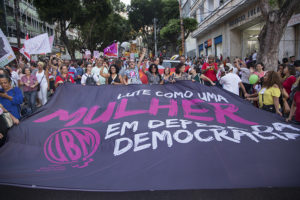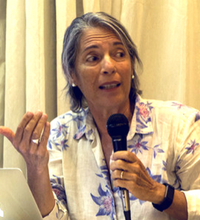Since 2008, we have been experiencing an economic crisis of incalculable proportions and no prospect of a solution is yet in sight. This is an extremely serious situation in the financial system, caused by the excessive liberalisation of capital flows and applications which started in the USA and spread to Europe and the rest of the world. Its backlash in the developing countries was no less intense, even though each of these countries, according to its own internal capacity, tried to save itself from the looming debacle. However, it seems so far that all countries were set adrift.
The capitalist crisis of our times, or the revival of capitalism through this crisis, is characterised by the bankruptcy of a development model, which expresses itself by the energy, climate and food crises on the one hand, and on the other, by a deep crisis in the political systems of so-called modern democracies.
Nation States have been incapable of mediating the multifarious interests of society and are being superseded by the interests of large economic conglomerates. These conglomerates generally have the strength to impose their will on political and economic processes at their own convenience. The results of this include the privatisation of public goods, a reduced role of the State and polemic proposals such as public/private programs (PPPs).
The privatization of the State and multilateral institutions are now facts1. We are experiencing an era in which corporations exercise unchecked power over local, national and international governments. Such corporations set priorities, dictate rules and exert a strong influence in the political-economic agendas. In short, they own the market. At the same time, they destroy all that happens to be in their way. And so the policies that enforce human rights, combat inequalities and promote social justice are being ruthlessly confronted and quickly pushed aside.
Nowadays, it is common and ‘natural’ for corporations to have a seat at UN negotiations, acting, for instance, as advisors to the UN Secretary General, and to actively participate in international agreements. This practice was consolidated in 2007 with the creation of the Global Compact, and the GC’s political strength and financial participation have increased since then.2 Meanwhile, the reverse phenomenon has occurred in terms of representativeness (and mandatory support) by the countries, which have increasingly lost decision-making capacity and power. Indeed, the UN is becoming a captive of financial corporations and is being submitted to the interests and threats of the richest countries. It is no coincidence that the Trump administration is taking its first steps toward promoting cuts in funding for multilateral institutions, including the UN.
In the political field, democratic processes are being undermined by economicism and its logic, with resulting unemployment, the gradual loss of rights that were won after decades of struggle, and forced migrations caused by the climate crisis and war, among others. In recent years, the countries that experienced social democracy after a violent World War II and largely inspired the democratisation and incorporation of human rights in a number of developing nations, are now starting to experience cuts in social rights, promotion of austerity policies, closure of their own frontiers and to promote far-reaching discrimination.
In this context, representatives of the conservative elite worldwide are taking on the governments of their countries through election processes that are questionable from a democratic standpoint. These processes include Brexit in the UK; the Trump elections in the USA; radical religious groups in Turkey; liberal conservative governments in Europe; and a succession of coups d’état in Latin America that include countries such as Paraguay, Honduras and Brazil. In this article we will is configured and how it affects Brazil in fulfilling the broad Sustainable Development Goals agenda.
PATHWAYS TO THE 2030 AGENDA
In such context, what is the role of recently signed international agreements such as Rio+20, the Paris Agreement on Climate Change and the 2030 Agenda for Sustainable Development that establish a possible international framework, considering the uneven correlation of forces that is emerging from the above-mentioned facts?
Starting with the UN Conference on Environment and Development (the Rio de Janeiro Summit of 1992) several global meetings took place to deepen the bond between countries and their peoples with a new framework for rights and a new logic about the meaning of development. For this reason, the concept of development became a point of mutual dialogue for all themes at the summits promoted by the UN. During that period, the UN was still able to inspire a de facto global sense of political trust that allowed it to legitimately gather its member countries for several high level international meetings based on a human rights framework and approach. We refer to this phase as the Social Cycle of the United Nations.
A favorable political environment was noticeable during that cycle – as long as discussions on who would pay for the transitions between different development models were kept off the table. This was indeed one of the issues that blocked all negotiations, restructured institutions and redefined the actors who make decisions at the international forums. The international institutions are still the same, but a power shift has taken place. In 2000, as the Millennium Development Goals (MDGs) were launched and following the beginning of a new conference review cycle, signals of the “fatigue” of the international system became clear. The financial crisis of the traditional governance system contributed to weaken its activities even further. Since then, both the UN System and the nation states represented in it have gradually lost their strength and vigour. With this process in course, their agreements and treaties became more and more a matter of discourse and few of them have been effectively implemented. As a result of this situation, which is referred to as the “Summits’ fatigue”, an entire process was left in a state of risk that was reflected in the presentation of the Millennium Goals.
From then on, the world has endured all types of economic crises, starting in Southeast Asia and including the economies in transition in Latin America (Mexico, Brazil, and Argentina) and, more recently, the developed countries themselves. Since the outset of these conferences, several social movements and civil society analysts – among them the Social Watch Network – drew attention to the urgent need for a new international financial architecture, a new governance and increased social responsibility by the Bretton Woods institutions and the World Trade Organisation (WTO). These movements and analysts warned about the need to assess the social and environmental impacts of liberalising investments in all corners of the planet, and about how essential it is to seek new development models based on sustainability, a departure from the neoliberal economic view and on tackling socio-environmental issues and the challenge of feeding the world population.
Issues such as poverty, inequality, foreign debt, official development assistance (ODA), the need for a new financial architecture, sustainable development, and a new governance system, are always a part of the vocabulary of social movements and civil society organisations, have not met with an effective response, while the UN did not have the necessary political strength to reverse international economic and financial decisions. Global policies started to be defined by the richest countries of the world in the G8 and at the World Economic Forum and were later elaborated and implemented by the international financial institutions and the WTO. As the economic crisis began to severely affect the G8 countries, the world’s governance system underwent some changes and a number of developing countries were summoned to this restricted group, to meet as the G20. This is one of the new configurations that have taken shape in the world since the financial crisis of 2008. But none of its features is directly concerned with strengthening the multilateral system spearheaded by the UN. This movement has a new governance format, and new authors are now exercising power.
However, to secure the hegemony of this privatisation process for the multilateral system and for nation-states, it was necessary to change the previous framework of legally constituted rights. In this context, the Global Compact3 was created with the role of providing advice to the UN both under the leadership of former Secretary-Generals Kofi Annan and Ban Ki-Moon and also to the current UN Secretary-General António Guterres of Portugal. The Global Compact took up the environmental agenda renewed at the Rio+20 Conference, along with all post-2015 discussions. It presents itself as a solution to the global problems of poverty and the climate
crisis by resorting to new types of technologies and funding options, and defending new political and economic governance models via public-private partnerships (PPPs).
The report written by the Global Economic Forum before the Rio+20 conference states – and this is the guideline that has been followed since then – that the governance system of the future will be better administered by coalitions of multinational corporations, nation states (including the UN) and a select group of non-governmental organisations.
According to data from the World Bank and Fortune magazine, three mega-corporations (Royal Dutch Shell, Exxon Mobile and Walmart) had more political and economic power in 2011 than 110 of the 175 largest global economies – i.e. more than half of the UN Member States.4 Such a situation leads to a staggering imbalance in the global power system and reveals the unambiguous power of these corporations in the world and in political decision-making spaces.
In this context, one of the main challenges that permeate the construction of the 2030 Agenda is the dilution of public power both nationally and multilaterally. One of the facets of such dilution is contained in the proposals of public-private partnerships (PPPs), which are based on a narrow view of economic growth and on market solutions for the issue of sustainable development, thus depoliticising the causes of poverty, inequality, environmental imbalance and the climate crisis.
While recognising that the global agenda is largely caught in the grips of private conglomerates, it is still important to underscore that this agenda is crucial for ongoing efforts to cope with the serious crises of environment and civilization we are now facing in our own day. It must be recognised that the SDGs still represent progress in terms of commitment by UN Member States since it fosters the implementation of wide-scope policies. Without them, the countries would not meet their chartered objectives.
Within the present political and economic context, will Brazil be capable of fulfilling the commitments established by the 2030 Agenda?
REFLECTIONS ON THE CASE OF BRAZIL

After 27 years without political coups, Brazil recently experienced a new democratic disruption. According to philosopher José Antônio Moroni, member of the Executive Board of the Institute of Socioeconomic Studies (INESC),5 a political process took place in which some State institutions, political parties, mass-media outlets, churches, entrepreneurial sectors and “street movements” forged the impeachment of former president Dilma Rousseff without the sufficient and necessary legal grounds.
The political arrangement that led to such a break in the democratic order included the imposition of an ultra-liberal agenda that violates and destroys hard-won rights and social policies. The new heads of the Executive Branch, along with their strong base at the National Congress – forged via corrupt practices and the co-optation of political representatives and the judiciary – quickly implemented a deconstruction of the already fragile democratic rule of law that emerged after the end of the military dictatorship in Brazil (1964-1985).
The first ‘package’ delivered to the economic-financial elite that stood behind this coup was the approval of the so-called ‘cap amendment,’ a reference to Constitutional Amendment 95, which established a freeze on primary expenses to limit increases in public spending in real terms for 20 years.
Several political and economic analysts, social movements, NGOs and activists unanimously agreed in their assessments of the deep retrogression that enacting this amendment will produce in terms of rights. Popular reactions against it were also expressive, but they were blatantly ignored by the mass media and stifled by police repression.
Such a cycle of ultra-neoliberal reforms has advanced rapidly. The deterioration of work conditions and cuts in labor costs as solutions for resuming the accumulation of capital were secured through the quick approval of a legislative change that authorised outsourcing as a practice for all sectors and categories, which represents a deep loss of labor guarantee mechanisms.
The next reform of the neoliberal agenda will tackle social security. It has become a key piece in the strategy to constrict the role of the State and extirpate rights in Brazil. These reforms add up to other reforms currently in progress in the environmental area, which include provisions to render the environmental licensing process more flexible, review the policy that recognises and secures indigenous lands (to avoid additional demarcations), deconstruct the national policy of protected areas, increase flexibility and stimulate access to mineral resources, and expand land entitlement rights by foreigners, among other measures. All these reforms profess the same logic: to extend the spaces of accumulation through access to and appropriation of the country’s natural resources.
Privatisation and the unchecked spread of Public-Private Partnerships became the third element of Brazil’s austerity measures. To proceed down this path, the Temer administration issued Provisional Measure 727/2016 and institutionalised the Investment Partnerships Program (PPI in its official acronym). PM 727 was the second measure adopted by the current administration, and it was issued even before the end of president Rousseff’s ‘impeachment’ process.
The combined and intensified effects of such reforms, budgetary cuts, and privatisation processes can be traced back to a clear logic: on the one hand, to reduce to the utmost the role of the State, both as a guarantor of rights and a regulator of capital; and, on the other, to reduce to the utmost the costs and opportunities so that capital may resume its accumulative trajectory in Brazil.
In such context, the hard-won universal welfare policies secured by the 1988 Constitution, such as education and social security are being dismantled, not only as a way of cutting social expenses, but also to provide new business opportunities and create the space so that economic groups may take hold of a considerable health and education market. At the same time, under the guise of a fiscal adjustment, the few policies that still strive to break with Brazil’s historical inequalities and combat the country’s shameful situation of poverty are being either cut, eliminated or changed for the worse. Thus the ongoing processes that seek to realise rights are being cut, while those public institutions and policies that worked to recognise the rights of historically rejected and invisible populations are being dismantled.
It is in such complex scenario, as we seem to stand before a long path of consequences and resistance, that the SDGs are starting to be implemented in Brazil.
In context, and in the light of the current deconstruction of the country’s already fragile welfare state and the lack of a budget to finance its adequate realisation, it is indeed likely that Brazil will not be capable of adequately implementing the SDGs.
The current positions expressed by Brazil at UN meetings demonstrate these facts: 1) Brazil has voted against the drafting of a report on the effects of austerity measures for human rights at a meeting of the Human Rights Commission in March 2017 [2]) Brazil did not support the draft text containing fiscal justice suggestions for attaining women’s rights at the 61st session of the Commission on the Status of Women in March 2017.
We are facing an imposed and illegitimate Brazilian government that promotes actions and sets up makeshift devices on behalf of the SDGs to justify its commitments internationally, while it is rendering these same SDGs unattainable as a result of its political and economic decisions. We are indeed facing dark times in the present and in our prospects of a future for Brazil, for the region, and globally. In this context, the SDGs are a minimum reference – with a rough path ahead.
THE PPI AND PUBLIC-PRIVATE PARTNERSHIPS
The PPI is an initiative by which the Brazilian federal administration is trying to shun its duties. It is an attempt to tread a path of no return in a privatisation process with incalculable damage in a number of ways for Brazilian society. Behind its neoliberal project stands the vision that it is not a task of the State to invest in basic sectors such as sanitation, along with the fallacy that such resources are essential for attaining fiscal balance. Brazil’s recent past already demonstrated that privatisations do not solve the country’s fiscal problem and that oftentimes, the bills and damage to citizens are too high.
As during the Fernando Henrique Cardoso administration (1995-2002), the National Economic and Social Development Bank (BNDES) is the institution responsible for implementing the PPI. The BNDES plays the strategic role of providing long-term funding based on a perspective of support to strategic sectors for development, but now its main mission is reduced to structuring privatisation and concession projects under the Investment Partnerships Program (PPI), which favors financial investors.
With the rationale of promoting new projects, which will emerge in the form of concessions, the government has cut environmental and human rights standards and guarantees by ordering public bodies to accelerate licensing processes for large works and projects.
It is in this context of “producing a favorable business environment” that the federal government is preparing a project to review its licensing processes and regulate what the PPI already does: to clear to path from any ‘hurdles’ (namely social, environmental, cultural and labor rights) that may either postpone or affect the profitability expected by investors.
NOTES
1 Adams, Barbara, and Jens Martens. Fit for whose purpose? Private funding and corporate influence in the United Nations. Global Policy Forum (GPF). Germany/
USA, 2015.
2 Adams, Barbara, and Jens Martens. Fit for whose purpose? Private funding and corporate influence in the United Nations. Global Policy Forum (GPF). Germany/USA, 2015. Chapter “The UN Global Compact”, page 38, chart 9
3 Available at: http://unglobalcompact.org/Languages/portuguese.
This article is published in the DAWN Informs July 2018. It is a summary adapted from the original article published by Social Watch: “Utopia or Dystopia? The Sustainable Development Goals in Brazil and in the World”. Available at: http://www.socialwatch.org/node/17748
Leer la versión en español aquí.



